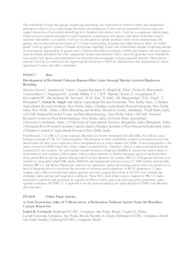A gene expression atlas of Vellozia nivea, a desiccation-tolerant species from the Brazilian campos rupestres.
A gene expression atlas of Vellozia nivea, a desiccation-tolerant species from the Brazilian campos rupestres.
Author(s): GERHARDT, I. R.; OKURA, V. K.; DANTE, R. A.; ARRUDA, P.
Summary: Velloziaceae are an angiosperm family that contains the most desiccation-tolerant species (approximately 200 out of 270 species). More than 80% of the Velloziaceae species occur in South America, where the greatest morphological diversity is also found. The genus Vellozia comprises both desiccation-tolerant and non-desiccation-tolerant species, offering an excellent model for studying the evolution of desiccation- and drought-tolerance traits on plant genomes. To date, only limited genomic or transcript sequences are available for Velloziaceaespecies. Here we present a Vellozia nivea gene expression atlas across different plant organs and tissues, including flower, developing seeds, root, leaf, stem and seedling. Vellozia nivea is a desiccation-tolerant species, endemic to the Brazilian campos rupestres (rupestrian grasslands) and highly adapted to their extreme conditions. A total of 180.67 Gb of raw data were generated, and of these, 152.79 Gb were subjected to downstream analysis after quality control (QC). Vellozia niveade novotranscriptome assembly was performed with the Trinity bioinformatics tool, resulting in 684.615 contigs. After filtering contaminated sequence contigs from bacteria and fungi and removal of contigs with less than 10 sequence reads associated with the initial assembly, the transcriptome resulted in 195.512 remaining sequences. A GO enrichment analysis was performed on tissue‐specific transcripts. The Vellozia nivea transcriptome should be a useful resource for genome annotation and gene function discovery studies.
Publication year: 2020
Types of publication: Abstract in annals or event proceedings
Keywords: Expressão gênica, Gene expression, Vellozia
Observation
Some of Embrapa's publications are published as ePub files. To read them, use or download one of the following free software options to your computer or mobile device. Android: Google Play Books; IOS: iBooks; Windows and Linux: Calibre.
Access other publications
Access the Agricultural Research Database (BDPA) to consult Embrapa's full library collection and records.
Visit Embrapa Bookstore to purchase books and other publications sold by Embrapa.

